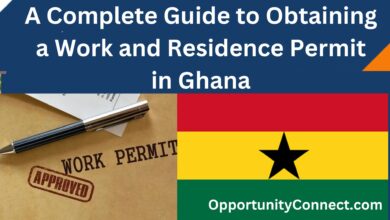Top Countries that give Work Permit after Graduation.

Introduction: Navigating Post-Graduation Opportunities: Work Permit Trends in Top Countries
In recent years, there has been a noticeable increase in the number of countries offering work permits to international students after graduation. This evolving trend reflects a global recognition of the valuable skills and perspectives that international graduates bring to the workforce. With the rise of global education, more students are seeking opportunities not just for studying abroad but also for building their careers in the same country post-graduation.
The availability of a work permit after graduation is a crucial factor for students as they plan their education and future careers abroad. These policies not only allow them to gain practical experience in their field of study but also provide a pathway to long-term career development and sometimes even permanent residency. As the global job market becomes increasingly competitive, the ability to stay and work in the country of study can offer a significant advantage.
Understanding the landscape of work permit options in various countries is essential for students to make informed decisions about their education and career paths. Each country’s specific policies, eligibility criteria, and the benefits associated with their post-graduation work permits vary, making it important for students to consider these factors when choosing their study destination.
This article aims to explore the top countries that offer work permits to international students after graduation, delving into the details of each nation’s policies and what they mean for students’ career prospects. As we uncover the opportunities associated with work permits after graduation, students can better prepare for a global educational experience that extends beyond the classroom and into the international job market.
Criteria for Selecting Top Countries for Work Permit After Graduation
When determining the top countries that grant work permits to international students post-graduation, several key factors play a crucial role. These criteria are essential in assessing the feasibility and attractiveness of staying in a country after completing studies. Let’s delve into these factors to understand what makes certain countries stand out in offering work permit opportunities after graduation.
Ease of Obtaining a Work Permit
Simplified Application Process: Countries that offer a straightforward and less cumbersome process for applying for a work permit gain a higher ranking. The simplicity of the application procedure, including clear guidelines and minimal bureaucratic hurdles, is a significant consideration.
Relaxed Eligibility Requirements: The eligibility criteria, such as the necessity of a job offer, the level of required professional experience, and language proficiency requirements, influence the ease with which graduates can obtain a work permit.
Duration of the Work Permit
Length of Stay: The duration for which the work permit is valid post-graduation is a critical factor. Longer durations provide graduates with more stability and ample time to gain significant work experience or seek permanent residency options.
Extension and Renewal Policies: The possibility and ease of extending or renewing the work permit also play a part in evaluating the country’s attractiveness for post-study work opportunities.
Employment Opportunities
Job Market Accessibility: The availability of job opportunities in various fields and the country’s economic health are pivotal. Countries with robust job markets and high demand for skilled graduates are more appealing.
Support for International Graduates: How well the country supports international graduates in finding employment through services like career counselling, job fairs, and networking events also matters.
Work Rights and Benefits: The rights and benefits associated with the work permit, such as the ability to switch employers, work in any sector, and access social services, enhance a country’s appeal.
Additional Considerations
Pathway to Residency: The possibility of transitioning from a work permit to permanent residency or citizenship can be a deciding factor for many students.
Cultural and Social Integration: The ease of integrating into the society and culture of the country, including community support systems and inclusivity, also influences the choice.
When considering the best countries for a work permit after graduation, factors like the ease of obtaining the permit, its duration, the vibrancy of the job market, and additional opportunities for professional and personal growth are key determinants. These criteria help in identifying countries that not only offer a stepping stone into the professional world but also pave the way for a fulfilling post-graduation life.
Country-by-Country Analysis: Work Permit Policies After Graduation
In the quest for the best countries offering work permits after graduation, each nation stands out with its own unique policies and opportunities. This analysis dives into the specific aspects of these countries, focusing on their eligibility criteria, application processes, and the duration of work permits.
Canada
Policy: The Post-Graduation Work Permit Programme (PGWPP) allows students to work in Canada for a duration equal to their study period, up to a maximum of three years.
Eligibility: Graduates from eligible Canadian higher education institutions can apply.
Application Process: Students must apply within 180 days of completing their academic programme.
United Kingdom
Policy: The UK’s Graduate Immigration Route offers a two-year work permit for bachelor’s and master’s graduates and a three-year permit for PhD graduates.
Eligibility: Graduates from recognised UK universities who have a valid Tier 4 visa at the time of application.
Application Process: Applications are done online, with applicants required to prove their identity and provide a Confirmation of Acceptance for Studies (CAS).
Australia
Policy: The Temporary Graduate Visa (subclass 485) has two streams: the Graduate Work stream (18 months) and the Post-Study Work stream (2 to 4 years, depending on qualification).
Eligibility: Requires a recent qualification in a CRICOS-registered course.
Application Process: Apply online with evidence of qualification, English language proficiency, and health insurance.
Germany
Policy: Germany offers an 18-month post-study work visa, allowing graduates to seek employment related to their field of study.
Eligibility: Graduates from German universities.
Application Process: Apply before the student visa expires, with proof of graduation, health insurance, and sufficient funds.
United States
Policy: The Optional Practical Training (OPT) programme allows graduates to work for 12 months (STEM graduates can extend for an additional 24 months).
Eligibility: F-1 visa holders who have completed a programme of study.
Application Process: Apply through the university’s international student office with a completed I-765 form.
Sweden
Policy: Offers a 12-month work permit after graduation to seek employment or start a business.
Eligibility: Graduates from Swedish higher education institutions.
Application Process: Apply before the expiration of the student permit, with proof of graduation and financial means for the duration of the stay.
Each of these countries presents unique opportunities for international students seeking to extend their stay through work permits after graduation. By understanding the specific requirements and processes of each country, graduates can strategically plan their education and career paths to take full advantage of post-study work opportunities. This insight into the various policies and procedures is crucial for those aiming to seamlessly transition from student life to professional employment in a foreign country.
Challenges and Solutions in Securing Work Permits After Graduation
Navigating the journey to secure a work permit after graduation can be fraught with challenges. Understanding these hurdles and knowing how to overcome them is crucial for graduates aiming to extend their stay in foreign countries for professional growth.
Common Challenges Faced by Graduates
1. Tight Deadlines: Many countries have strict deadlines for applying for a post-graduation work permit. Missing these can result in lost opportunities.
2. Complex Documentation: The process often involves gathering and submitting a plethora of documents, which can be overwhelming and confusing.
3. Job Market Competition: Finding a job that aligns with visa requirements in a competitive job market can be daunting, especially for recent graduates.
4. Language Barriers: In non-English-speaking countries, language proficiency can be a significant barrier in both the application process and job search.
5. Navigating Legal Requirements: Understanding and complying with the legalities of visa applications and employment laws can be challenging.
Solutions and Tips for Navigating These Challenges
1. Stay Informed and Plan Ahead: Be aware of the deadlines for work permit applications in your study country and prepare in advance.
2. Organise Documentation: Start compiling necessary documents early. Create a checklist and gather documents systematically to avoid last-minute rushes.
3. Leverage University Resources: Many universities offer career services, job fairs, and alumni networks that can be invaluable in finding suitable employment.
4. Improve Language Skills: If studying in a non-English-speaking country, take language courses or engage in language exchange programmes to enhance proficiency.
5. Seek Professional Advice: Consider consulting with immigration experts or legal advisors to navigate the complexities of visa regulations and work laws.
Additional Strategies
Networking: Build a network of professional contacts and peers, as personal connections can often lead to job opportunities.
Stay Flexible: Be open to various job roles, even if they are not your ideal position, as gaining work experience can open doors to more opportunities.
Utilise Online Platforms: Make use of online job portals, LinkedIn, and other professional networks to widen your job search.
Securing a work permit after graduation can be challenging. However, with careful planning, using available resources, and employing proactive tactics, the process becomes much easier. Staying informed, well-organized, and adaptable helps graduates effectively overcome these hurdles and lays the foundation for a successful global career.
FAQs: Securing Work Permits After Graduation in Top Countries
Navigating the process of obtaining a work permit after graduation can raise many questions. Here, we address some of the most frequently asked questions to clarify this process in the top countries.
1. Can I apply for a work permit in the same country where I studied?
Yes, in most cases. Countries like Canada, the UK, and Australia allow international students to apply for a work permit post-graduation, often with certain conditions like completing a degree from an accredited institution in that country.
2. How long can I stay in the country after graduation before applying for a work permit?
It varies by country. Generally, there’s a grace period ranging from a few months to a year, during which you can stay and apply for a work permit. For instance, in the UK, you have 2 years, while in Germany, you have 18 months.
3. Do I need a job offer to apply for a post-graduation work permit?
It depends on the country. Some countries, like Canada, do not require a job offer for the Post-Graduation Work Permit Programme (PGWPP). However, in countries like the US, a job offer related to your field of study is necessary for the Optional Practical Training (OPT) programme.
5. What if my student visa expires before I get a work permit?
You should apply for an extension. Most countries allow you to extend your student visa or switch to an interim visa while your work permit application is being processed.
6. Can I switch employers while on a post-graduation work permit?
In many cases, yes. Countries with open work permits, like Canada, allow you to switch employers. However, in countries with employer-specific work permits, like some categories in the US, you need to stick with the employer who sponsored your visa or apply for a new permit.
7. Is it possible to get permanent residency after my work permit expires?
Yes, in some countries. Many countries have pathways from a post-graduation work permit to permanent residency, especially if you have skilled work experience. For example, in Canada, work experience gained under PGWPP can help with Express Entry for permanent residency.
8. What kinds of jobs can I apply for with a post-graduation work permit?
It varies. Some countries allow you to work in any job, while others may require you to work in a field related to your studies. Always check the specific regulations of the work permit in the country you are interested in.
Understanding these key aspects can greatly simplify the process of obtaining a work permit after graduation and pave the way for a successful career in your chosen country.




